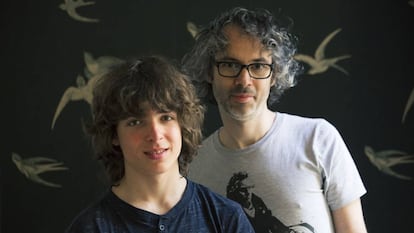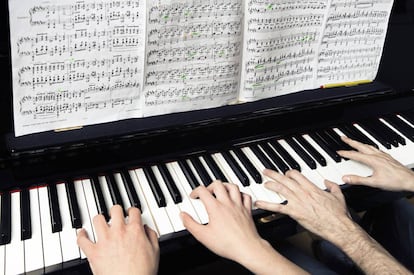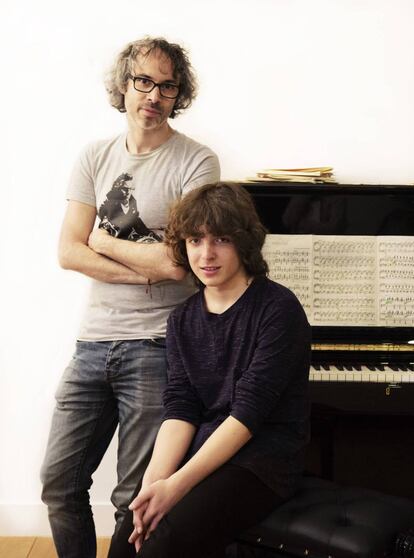The young Spanish virtuoso who wowed British pianist James Rhodes
A Madrid teenager is getting free lessons from the world-famous musician after dazzling him with his talent at a radio show

Nahuel Hagelstrom throws himself into the piece. His teenage body sways and his fingers run nimbly up and down the 88 keys, playing Rachmaninov. The famous British concert pianist James Rhodes watches with fascination. It’s the first time he has heard Nahuel play and his rendition of the Russian composer is spellbinding. Without missing a beat, he invites the boy to his home in the center of Madrid.
In the months that follow, Nahuel receives a couple of masterclasses from Rhodes free of charge. Today is his third, and as soon as he enters Rhodes’s apartment, the complicity between mentor and student is palpable. They are affectionate with one another and make inside jokes about something that happened the previous Saturday.
Then, Nahuel sits at the piano, stretches his arms and plays Rachmaninov’s Prelude Op. 3 Nº2. Standing beside him, Rhodes moves a pencil as though conducting. Then gently, he interrupts. “Stop, stop,” he says, putting his own hands on the keys next to Nahuel’s. “When you change the note here, do it like this. It’s easier and it sounds better.”

Nahuel copies Rhodes and smiles. “Since I’ve been coming to see James, I’ve radically changed the way I play,” he says. “Before I was all about technique. He has taught me to get the maximum musicality out of the piano and enjoy it more. I’ve improved a lot.”
He has improved so much, in fact, that he has just been awarded first prize at the Gran Klavier International Piano Contest in Alcalá de Henares, where he dedicated his win to James. “Meeting him is one of the best things that has ever happened to me, if not the best,” he says.
Rhodes came to Nahuel’s attention two years ago and quickly turned into his idol. He would spend his Saturday mornings listening to Rhodes’s section on radio program A vivir que son dos días, on the Cadena SER network. “One morning he said that Rachmaninov didn’t usually appeal to young people,” says Nahuel. “And as he is my favorite composer, I wrote in.”

Nahuel didn’t expect a reply, and was surprised when one came, particularly when it included an invitation to visit the radio station and play something live for Rhodes. “I just about fainted,” says Nahuel. Managing to keep his nerves in check, his performance was described by Rhodes as “brilliant” and the admiration became mutual.
“I felt that if I could just spend a few hours with him, I could turn a very good performance into a fantastic performance,” says Rhodes, who has lived in Spain for a year and is learning Spanish but still feels more comfortable speaking in English. “It’s not easy to find a child with so much talent and enthusiasm and capacity for work.”
Nahuel is not like the other boys his age. He grew up listening to sonatas by Liszt and symphonies by Beethoven. His father is a piano teacher and by age three, Nahuel was already preparing to enter the conservatory. Now that he has turned 15, he can’t imagine life without classical music; his dream is to be accepted by the Reína Sofia School of Music and become a great concert pianist like Rhodes. Of course, his friends are not always on his wavelength. Classical music bores them but he doesn’t care. “When I play, I go to my own special world. I feel love, joy and sadness. And the urge to break the piano, too!” he says. “It’s my refuge.”
It’s as though Messi or Cristiano Ronaldo were telling a child who dreams of becoming a soccer player that they admire him Nahuel Hagelstrom
Rhodes, 43, nods as Nahuel speaks. “It was exactly the same for me,” he says. “Music has always been like my oxygen. And it was my best friend when things were rough.” The pianist is referring to his childhood and teenage years which were scarred first by sexual abuse and subsequently by drugs, all of which he speaks about in his book, Instrumental, published in 2014. “When I was little I didn’t have the words to describe what I was feeling,” he says. “The notes became the words.”
Music – and psychiatrists – saved Rhodes from the torture of his youth, but he has always shunned the cliché of the tormented artist. He maintains that success does not necessarily go hand in hand with pain. Music is born of feeling. Which is why he encourages Nahuel to enjoy his adolescence. “You need to practice and keep at it,” he says. “But you don’t have to go overboard. Some teachers push too hard. I think this is the perfect time for Nahuel to experience new emotions and create music out of them. He’s got a lot to say both at the piano and away from it. It’s the first thing that struck me when we met. That day I became his first fan, but he’ll have plenty more in the future. I am dying to see him play in a big arena.”
As Rhodes speaks, Nahuel blushes and stares at the floor. Then he pipes up: “It’s as though Messi or Cristiano Ronaldo were a child who dreams of becoming a soccer player that they admire him.”
Rhodes smiles. There is a clear connection between the two. “We both love music and the same composers and pieces,” says Rhodes. “I identify with Nahuel. He reminds me a lot of myself when I was young. I really believe he will go far, and I will be there in the audience to see it when he does.”
English version by Heather Galloway.
